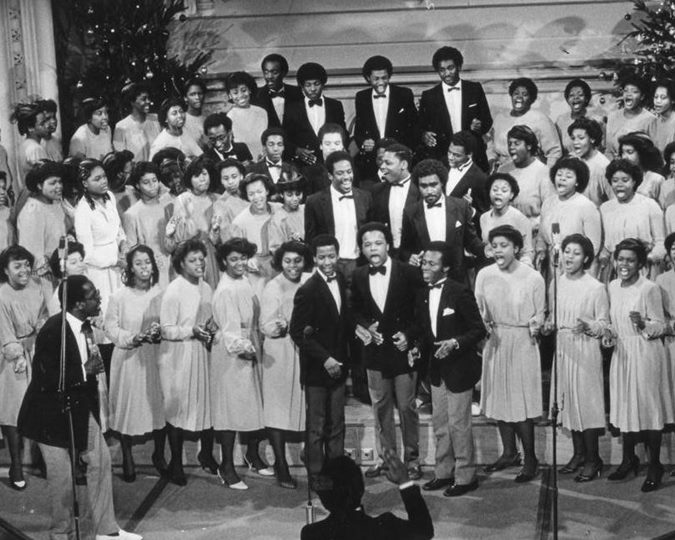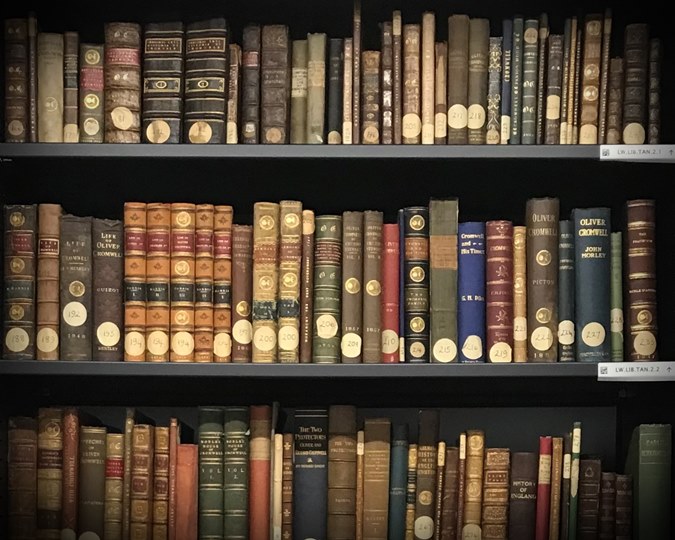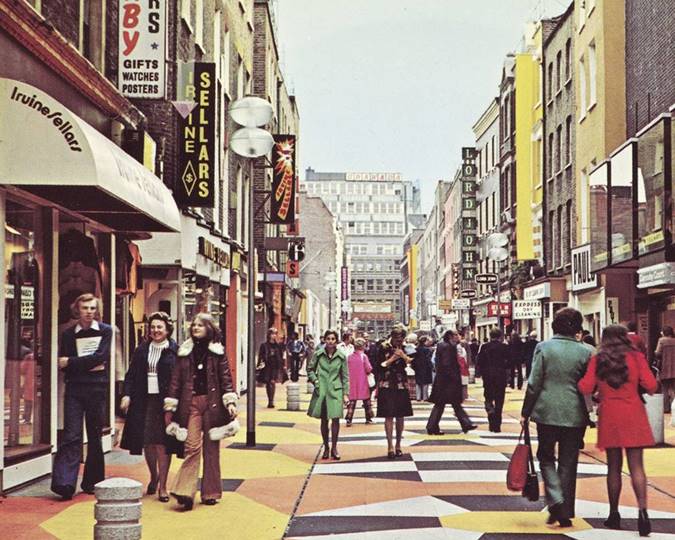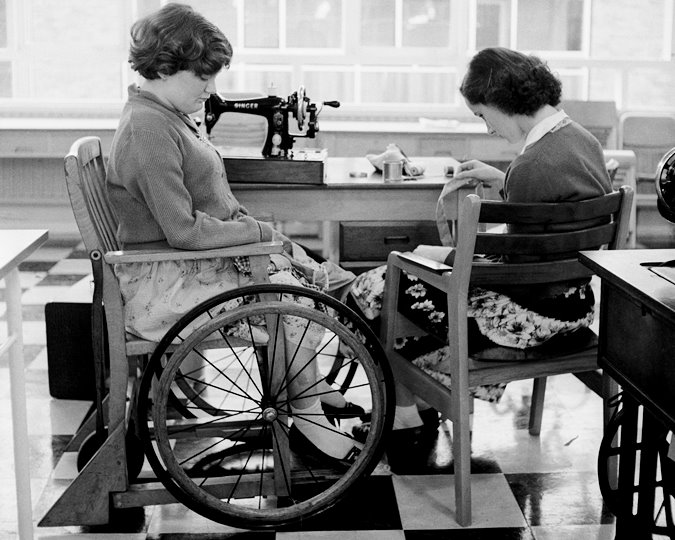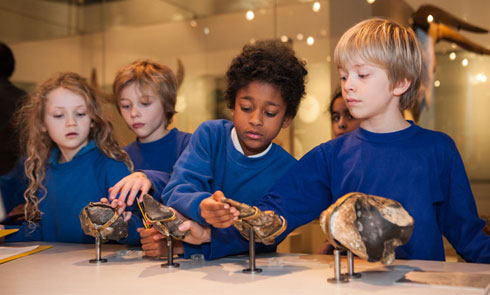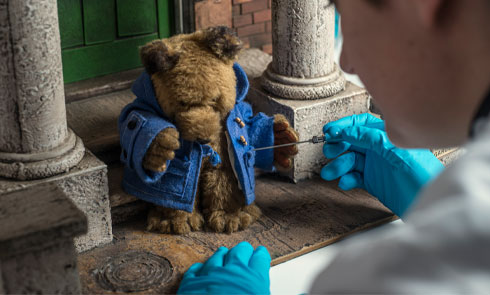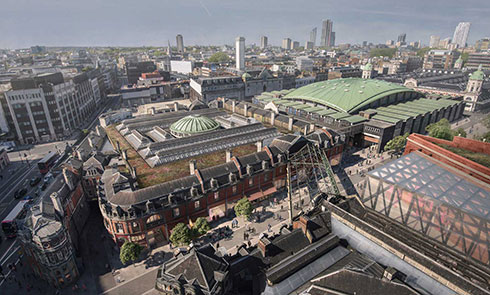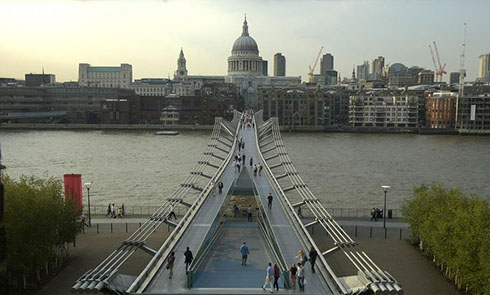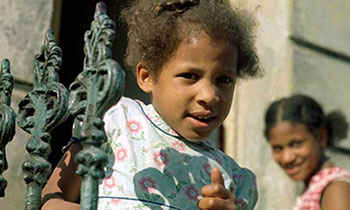Docklands Soundscape: echoes in time
Take a trip back in time with the Docklands Soundscape, echoing back to us the voices and sonic histories of the docks from the lived experiences of volunteer researchers Deborah Levett, Gemma Suyat, Joan Gandy, Kate Cameron, Lauren Spinner, Nick Corrigan and Susan Winterbourne.
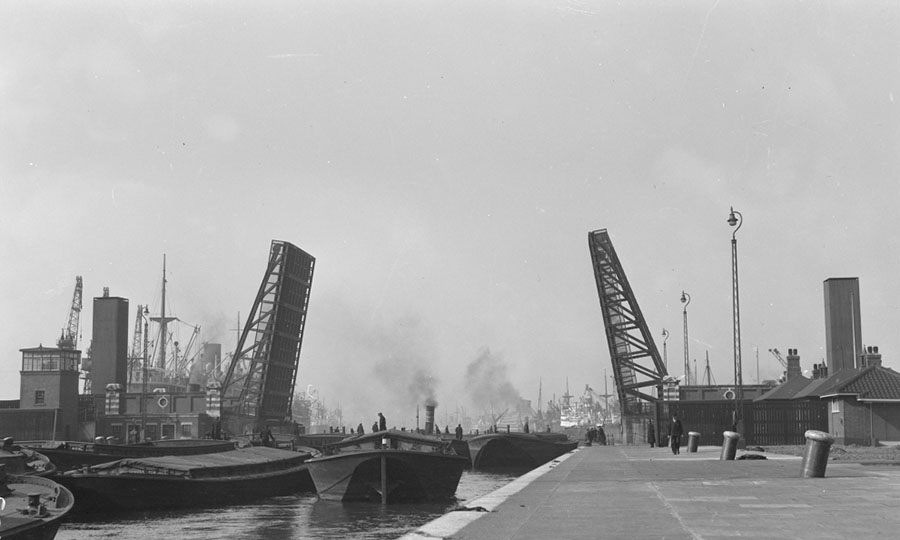
King George V Dock: A busy scene - the entrance Lock on 14th March, 1935
Photograph by Linney, Albert Gravely, digital image © Museum of London
Assistant Curator
Flowing through aspects of docks’ life, this soundscape plays from five speakers as an installation at the Museum of London Docklands, for the duration of the London: Port City exhibition, or can be heard below. Starting on the Thames, it moves to the docks, then to the camaraderie of the pubs and finishes with New Year’s Eve – or Old Year’s Night as it was known in the area. It is intertwined with sections of oral histories recorded over thirty years ago from the museum’s collection relating to Docklands’ working life.
It was made as part of Listening to London, a community-led research project focussed on our oral history collection. My colleague Hannah Davis and myself had the privilege of working with seven volunteer researchers - Deborah Levett, Gemma Suyat, Joan Gandy, Kate Cameron, Lauren Spinner, Nick Corrigan and Susan Winterbourne - who have deep connections to the area. They listened through over 100 hours of the museum’s oral histories connected with docks’ life and made selections based on their lived experiences to highlight for the London: Port City exhibition and the Museum of London’s permanent records.
“One memory will bring another memory forward”, a description used by Deborah Levett, one of the volunteer researchers, about this experience. Meeting once a week online through the lockdown of early 2021, discussions moved back and forth between the words of the oral histories to the recollections of the researchers themselves. It became increasingly clear that sound played an important part in their memories of the docks, the Thames and events in their lives. The richness of the researchers’ remembrances included what they had heard, distilled into these moments in time. Their lived experiences formed the basis of the soundscape while the intertwined voices are also from the volunteer researchers’ selections. Hear in their own words below some of the researchers’ memories from conversations recorded over zoom in September 2021.
Introductions
We have introductions and connections to the docks from Deborah Levett, Joan Gandy, Susan Winterbourne and Kate Cameron.
My name is Deborah Levett, but I prefer to be called Debbie. My connection to the docks is through my family. We have three generations of stevedores, and my dad was a stevedore, right up till the closure of the docks in 1980, so it’s a long history with the docks. Also my- the generation before that, my great great grandfather he came to the island [Isle of Dogs] for work, to work in the docks but he wasn’t sort of, he was a labourer not a stevedore or anything. So yeah a long long history.
Hi I’m Joan Gandy, and my dad’s family particularly were very strongly connected to the docks. They were merchantmen, and merchantmen either do apprenticeships in the docks and then go off or after they’ve served their terms in the navy, and usually have families, they come home and then they usually work down the docks. My father did that and he became a ship’s rigger, until he was made redundant, after everything moved to Tilbury. I had an uncle who was in the customs, who was a customs officer. My brother did his engineering apprenticeship before he joined the New Zealand shipping company, and various cousins who did one or the other of those things.
So my name is Susan Winterbourne. The reason I’m connected to the docks is my dad worked on the docks from the age of fifteen until he did his apprenticeship and finalised his apprenticeship in the 1950s. I’ve always had strong connections to the river Thames. I’m really blessed that my dad is still alive and we regularly go still to London, we walk along the river, if and when we can, to actually just reminisce and talk about mainly his river experiences overall.
My name is Kate. My connection with the river goes back many years. I married into the river. Both my children were apprenticed to the river, they did a seven year apprenticeship each, girl and boy. I also worked on the river for a short while, I worked on the passenger boats and party boats. Absolutely love it. We always say in the family that you have either blood in your veins or river water and it’s river water for us, never go far from it.
Bells and whistles
A whistle is another name for a horn. Susan Winterbourne and Kate Cameron describe the times a horn or a bell might be used and the meanings of the types of ways they may sound.
SW - Normally the only time on my dad’s tug that you’d ring the bell was in fog or in bad weather. And one thing because I said to him “Oh my goodness the poor captain having to ring that bell continuously” and he said “No, you’d leave it maybe, you’d have a few rings on the bell and leave it maybe a few minutes and then sound your bell again”. Because none of us are going to appreciate just how foggy it was, it was a dense fog, you couldn’t see in front of you which is why so many tugs did such long shifts overall purely because they were stuck in fog.
KC - It’s not so much the ships, it’s the tugs when they’re going through different arches, or when they want to turn, it’s signals to one another. And you can’t shout, you know you just can’t shout, so to warn other tugs and other boats you have signals, and it’s different blasts to say which arch you’re going through, where you’re going to turn, where you’re going, and also they used to have, they still do it but not so much now, because of the noise, tugs, the olden tugs they were amazing, they were noisy, and they were hot and they could be really smelly. But they were great, so you couldn’t talk to another, so you’d just literally do sign language to someone else on another tug, not to give signals about turning but to have a conversation like “I’m going out”, “I’m getting married”, all things like that you know, that’s how it was. It’s not so much like that now, because everybody’s got radios, bit boring now!
SW - There’s two terms or two names for the horn, it was also referred to as a whistle overall. For example there was four long whistles and one short whistle would indicate turning to starboard, so that was one option so if you heard the whistle, four long whistles and one short that would indicate the turning to starboard. If not, the other option was four long whistles were used and two short ones which meant they were going and turning to port, often where the north shore was at West India dock or Royal dock. That’s where the tug would sound the four long whistles and the two short. But if it was south of the river, for example turning in towards Surrey docks, there would be the four long and one short overall. I did love hearing the noises overall and again, I’ve probably mentioned previously but we did acquire, or my dad did acquire one from a redundant tug on the river which he proudly has in his hallway now.
On the Thames
Susan Winterbourne, Joan Gandy and Kate Cameron talk about the sounds of engines, the weather and tides, and the difference depending on whether a barge was loaded or not, or where you might be on a tug. Kate Cameron also shares a very special time on the river in the stillness of the night.
SW - Depending on what part of the boat you’re sitting on, a
different noise and feeling overall. For example if you’re at the back it’s
completely different to sitting at the front of the boat, and you can see the
tide, the river is flowing towards you. And also the wind changes direction
very often on the river, it can either be really hot, or really cold, windy and
you’d feel a chill overall. And then you’d sit at the back and depending on the
wind direction, that may protect you more overall so it’s less windy, but
that’s always to do with the weather overall. But as you walked alongside the
engine room, for example towards the back of the boat, then [you can] hear more
noises from the engine room, often the port hole it’s literally like a velux
window that would be positioned up, you’d lift it up and there’d be poles that open
the window and obviously the area to get into the engine room, so you would
hear a lot more noises as you’d walk around the side of the boat overall.
JG - I think being on a boat, that’s always- for me if I’m
on a boat it’s a nice comforting sound, I just like it. It is a comforting
sound you know. It’s not like a train, trains are whoosh, whereas a boat is
more of a chug chug, chug, chug, chug. And it’s kind of that, I don’t know,
it’s more of a lullaby.
KC - On a barge, a barge sounds totally different from
loaded and unloaded. Which is quite obvious but also you would expect a laden
barge to sound quite dull, whereas a light barge is going to have the
hollowness, but also depending on the water. Depending on the tide, you get
this, well the whole thing feels different, it will feel different if you’re on
a high tide to a low tide, and also if it’s ebbing or flowing. Because it’s
tidal, you will get the water, flowing in, and then it goes on the turn. And if
you ever look at the river, if you go down to the river and you watch it, you
will see the water literally coming in, and before it starts to ebb you get
that sort of swirl on all the water and that’s the tide turning and then it
starts to go out and you get the lower tide.
KC - The best possible time for me on the river Thames is, when you go on a boat, you are in the centre, the very heart of the city, it’s what drives the city, but you are removed from it, because what you’ve got is the river and the water. You hear the noise of the boats like the engines and things like that, but you don’t have any of those sounds that are on the shore. And my favourite time is, if you’re ever on a boat, about 4 o’clock in the morning and London is, it’s sort of sleeping, it’s just, it’s gone to sleep and it’s before it wakes up and you get the sun coming up, you get the sound of the water, it’s yours. That is the time for me that the whole, that river is absolutely mine, there’s nothing in the world like it, truly it’s the most amazing, it’s as if everything is there, it’s the sound, the smell, the stillness, it’s a gem it really is, I just fall in love with it every time I see that.
The Docks
Here Deborah Levett speaks about growing up around the docks and what the sound meant to her. She also tells us about navigating the Greenwich foot tunnel and why she sometimes created an echo there!
DL - Yes normally other than dock workers you weren’t
allowed into the docks, but we had what was called the glass bridge, which we
used to go up and over the docks, but when that was out of action, because my
dad worked in the docks we could actually walk through. So you’d actually
experience the sights and sounds. It was sort of not a very long walk, but yeah
my dad talking about the docks and also the boats and everything you could hear
from where you lived, you were just surrounding the docks. So it was not only
just that you saw it for yourself, it was more that you heard it, it was just a
sound that you always thought would be there.
DL - Yeah there was a comfort, it was a comforting sound,
because it was so familiar. Maybe I even thought that that’s what it was like
everywhere else. But growing up in a dock area, surrounded by the Thames, it
was just sort of that background sound that was very comforting and familiar.
DL - We weren’t allowed to go into derelict buildings or anything because obviously they were quite dangerous, and like I said before my mum was quite protective, so we didn’t go into like hidden tunnels or anything, but we did go under the Greenwich foot tunnel. And because you’re going under the Thames, when you see the dripping from the tiles, you do imagine the Thames coming in, sort of thing. When you’re young, your mind does actually run away with you, so you used to run through as quick as possible and it used to echo as well.
Pubs
Raise a glass and listen to Susan Winterbourne, Deborah Levett and Joan Gandy recall the noises of the pubs around the docks. The enveloping ambience was not just a background noise. It was the self-made entertainments and the joy of camaraderie, community and place through being surrounded by friends, family and dock colleagues.
SW - In respect of the river Thames overall so so many pubs
were so welcoming. Often it was the noise of the piano being played, most
people in that pub would know everybody, a real family unit overall. Often most
families would stay in there, say for example Sundays, Sunday lunch time
there’d be things like roast potatoes on the bar, lots of snacks and crisps and
pickled onions and the jellied eel man would come round with his basket and
share his jellied eels, and fresh fish and shellfish overall. That was a huge
part of the community, the pub, pubs along the river Thames, and you know in
London. The accents again have played a huge part in my lifetime overall, you
can immediately recognise someone for example with an east end accent and also
a south-east London accent as well.
DL – When I became of age when I could go in the pub with my
boyfriend, it would be in the saloon bar, because you’d actually be able to sit
down and my partner would go up to the bar and then you’d hear all the singing
and that sort of thing. But the sounds of the piano playing, the sounds of just
random sing-songs, they’d just break into singing and that sort of thing. The
pubs were on every corner really, literally and that’s because of the industry
and the docks. The pubs to me were the early day community centres. My father
and my grandfather weren’t big drinkers but they would go into the pub, they’d
love a Sunday drink and it was mainly to see their friends and to find out
about work as well as the social side.
JG – I do remember the pubs because you were always, you
used to be sat outside the pub with a bag of crisps with its little blue bag
and a bottle of pop. My dad was the one who was always singing and playing the
piano. But I suppose I remember much more the social life, the camaraderie much
more and that noise that went with it, and people making their own
entertainment really, much more so, I mean not everyone had tellies
[televisions] in those days. But families were very big but you’d always meet
in the pub and then you’d end up with a sing-song.
JG – The other thing I have a memory of is pianos used to end up at our house which is really quite bizarre, and because when they did kick us out [of the pub], my father would often say “Well can we buy the piano?”. And so he paid them to take the pony round and the horse and cart to our house and then the party continued. We didn’t end up with loads of pianos because a few days later they always got chopped up and buried in the garden! Like I say pianos were just moved around a lot, it’s weird actually but they were, you know you would wheel a piano down the road for a party. And if there was a street party, like I have photographs of my grandfather and my aunts and uncles celebrating coronation day, VE day and things like that, and there’d be a piano down that street, people would wheel the piano out. They would have all the tables and chairs out and they’d have paper ribbons festooned across the roads and they’d have a street party and it was a party, it’s not like now where you might have a street party and people might put a little music on in the background, they were knees ups you know!
New Year’s Eve
Deborah Levett, Joan Gandy and Kate Cameron share a very special time on the Thames, where boats of all sizes would ring in the New Year and family and friends would face the coming time together.
DL – New Year was probably my favourite time because you
could see the lights of the ships were all lit up and when we hit midnight just
all the hooters would be going and, like I said before, it’s almost like
they’re talking to each other or challenging each other. When I was younger,
you’d be at home and you’d have a family party and then soon as a couple of
minutes to midnight, you’d all go on the doorstep, people would get their pots
and pans and shout out “Happy New Year” to each other that sort of thing. And
then as I got older, I’d be looking after my cousins so we’d actually, if they
hadn’t have fallen asleep, we were allowed to let them stand on the balcony to
listen, and look at the boats, and the horns and everything going. It was
magical really. It was just that, your neighbours opening the door and shouting
“Happy New Year”, and the boats talking to each other. You know again, that’s
another goosebump experience for me and something I’d always thought would be
there. So that sort of New Year, sort of marked your calendar, that was
something, although it was cold, and dark and things like that, sort of New
Year’s Eve, family coming together or babysitting for my younger cousins or as
I got older with my own relationships. New Year was always about family.
Christmas was always about family, but New Year was when you all came together
to sort of face another year together, whatever that would bring, so New Year
with the boats and the tugs and the big containers, and things, everything
going, was lovely.
JG – The other thing I remember was New Year’s Eve, that was
always special because we were allowed to stay up, well I was allowed to stay
up, my brothers were much older, I don’t remember I think they used to go off places.
But I was allowed to stay up until midnight and at midnight, I always remember
hearing all the boats along the river, tooting and blowing their horns and that
was really special, you knew the New Year was here, and it always brought hope.
KC –It’s a tradition that all boats if it’s afloat, if it’s working that night that what they do is they congregate at Big Ben. So you’d go as near as possible to Westminster pier, but you don’t go alongside, you all stop, and usually happens they shut the river, so you have to be in place. You can’t just go “I fancy going there”, there is methods in it. The passengers, it’s always New Year parties and people sort of go “Right why we doing it?” and you go “We’re going to hang off Big Ben”, so you go under, and the passengers love it, because everything goes quiet. If like me you’re working behind the bar, you have to go hell for leather, because you’ve got to get everybody a drink, in their hand for midnight. Obviously all the music’s going and people are getting quite excited, and you get, like the boats I worked on you, we would all be ready, even the crews, even me, I would not serve a drink at midnight, because you’d go “Right get all your drinks, because we have to shut the bar because the bells are going”. And then, I know this sounds weird, but everybody goes quiet, the music goes off, and everybody stands, they’re all just that, you know that tense, waiting for something to happen, but because it’s on a boat they’re not sure, what’s going to happen. Then usually one of the crew will jump down [come down from the wheel box], and then you hear Big Ben bong – it’s not the fireworks, people go for the fireworks - they’re on the shore. This is, you are on a boat, and you are there, and you are getting the noise of Big Ben, that- it’s not an echo, it’s that noise of that bell, that bong going on the water. Everybody just, they just, they get quite emotional, they really do get emotional, you know it’s like “Oh my god that’s Big Ben and I’ve heard it on a boat”. It is amazing. Then everything goes back to normal after. You just usually you put them ashore, but it is, it’s quite, it’s as if actually when you hear Big Ben like that, not the fireworks, not the being on the shore, when you are on that water and you hear Big Ben you have truly been given the New Year. It’s a proper New Year.
Many of these sounds no longer remain - or at least not in the same combinations and intensity. The volunteer researchers highlighted that the Thames and Docklands have changed in many ways since. Working practices such as containerisation dramatically cut the workforce, hollowing out the docks and the communities along the river, emptying the pubs, warehouses and homes once teeming with shared friends and family.
Docklands Soundscape: Echoes in Time
Listen using headphones or earbuds to this binaural recording for a surround experience. Made using selections from freesound.org, reflecting back to us the lived sound experiences from the docks’ researchers and echoing the voices from the past.
Dockland Soundscape –
echoes in time
Oral history excerpts:
Wouldn’t change a
minute of it. I mean it’s the greatest life that anyone could live, and any
lighterman would tell you that.
Jeffrey Greenwood, Lighterman.
Like, everything was
rationed on the ship. You have so much sugar to last you the week, so much
coffee to last you the week, so much tea to last you the week, and even bread.
Frank Gabriel, Seaman.
Tilbury, the waters at
Tilbury dock was absolutely alive with eels, and my father said…
Edwin Hunt, Lighterman & HRH Bargemaster.
Well my folks had
always been seafaring folks. As far back as I’ve been able to discover, they’ve
always earnt their bread upon the waters.
Pat O’Driscoll, Sailing Barge Mate.
In the stores they had
a diver’s suit. “You’re the next one to do the diving” he said, “You’re going
in and try that suit on”
Walter Dunsford, Carpenter.
You had to be capable
of knowing what the job was all about.
Walter Dunsford, Carpenter.
Of course you’d be
shovelling away and it’d stop up like side of house.
George Pye, Stevedore.
But living in the dock
was very, very pleasant, very safe, and my wife loved it.
CMR HE Morison, Royals Dockmaster.
In a tiny little
single bed, was where Percy, Nancy and Edna used to sleep.
Dennis Pike, Stevedore.
But I can remember
going to school in the Sacred Heart and I couldn’t been much more than three,
in thick fog.
Mary Partlett, Limehouse resident.
We had some nice
outings organised like on perhaps, the King’s birthday in those days or the
Queen’s birthday in latter days.
EW Robinson, Messenger & Docker.
It’s quite nice to see
a Pearly King and Queen doing well a stint, in not a disco, but you know
ballroom.
Grace Smith, Pearly Queen.
And our first stop was
to go, go over there was Charlie Brown’s pub.
Rudolph Murray, Sailor.
Charlie Brown was
quite a character of course.
Lucy Collard, daughter of Lighterman.
The strong-arm men
they would always go to Charlie Brown’s and have a look round there, because it
was a very interesting pub
EW Robinson, Messenger & Docker.
And then they would
sneak a pint, lock the doors, and say we were in there until about eleven
o’clock, twelve o’clock.
Rudolph Murray, Sailor.
People that had pianos
if it wasn’t raining, they would push the piano out into the middle of the
road.
Lucy Collard, daughter of Lighterman.
And we used to go to
the Flying Angel, we’d go there dancing, used to be called the Flying Angel,
and we used to go down Commercial Road to little clubs, they had little clubs
down there.
Rudolph Murray, Sailor.
And we’d have a great
party, the whole length of the street, there would be a party, and at twelve
o’clock, the ships’ sirens used to go.
Lucy Collard, daughter of Lighterman.
Read more from the volunteer researchers and the oral histories they selected for the London: Port City exhibition and the Museum of London’s permanent records here.
Docklands Soundscape oral history excerpts are from the Museum of London’s Port and River and Harrison Line Oral History collections. Oral histories, interview excerpts and images on this page © Museum of London. Further information on the oral history interviewees featured in the soundscape is available below.
Docklands Soundscape sounds have been sourced from freesound.org, contributor references: 157284, 166118, 184578, 208714, 235441, 250192, 259671, 274604, 339517, 351567, 353232, 360684, 380825, 482950, 53406, 538010, 67236, 98479, 98834.
Soundscape arrangement and binaural mix: Rina Sagoo, multichannel mix and mastering: Museum of London AV Team.
London: Port City is delivered by the Museum of London in partnership with the Port of London Authority (PLA).
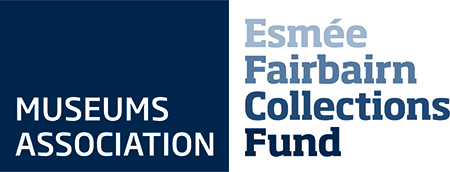
The volunteer research included here was part of the Listening to London project at the Museum of London, supported by The Esmé Fairbairn Collections Fund – delivered by the Museums Association.

